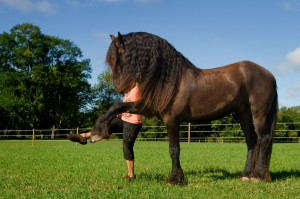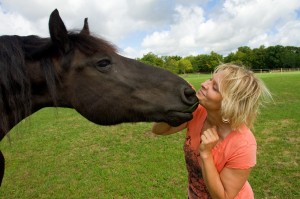 We all communicate through energy whether we are aware of it or not. It is the universal language. Horses are experts at reading energy and instinctually monitor their surroundings to stay safe. In Equine Therapy or Equine Facilitated Learning, we use these natural abilities to our learning advantage. Interactions with horses are magical. Almost immediately their responses towards us provide clues as to how we as an individual perceive and react to different types of circumstances, situations and relationships. Horses default to our innermost feelings and reflect that back to us in their reactions and behavior. This allows us to observe ourselves and how we express ourselves in our daily life.
We all communicate through energy whether we are aware of it or not. It is the universal language. Horses are experts at reading energy and instinctually monitor their surroundings to stay safe. In Equine Therapy or Equine Facilitated Learning, we use these natural abilities to our learning advantage. Interactions with horses are magical. Almost immediately their responses towards us provide clues as to how we as an individual perceive and react to different types of circumstances, situations and relationships. Horses default to our innermost feelings and reflect that back to us in their reactions and behavior. This allows us to observe ourselves and how we express ourselves in our daily life.
Horses are effective teachers because of what they represent to us. They speak of freedom, beauty, nature, and above all, power. These are all parts of ourselves that we struggle to accept and feel safe enough to express. In essence, in the presence of horses we are allowed to witness our self and become aware of how our fears limit our greatness!
A person’s interaction with horses demonstrates the dynamic that they have in a relationship. To grow and change we first need to know what we are feeling and communicating to the people in our life. Horses show externally what you are feeling internally, providing you with the opportunity to gain insight into yourself!
One of the best gifts horses offer us is that they invite you to shed your outward appearance and invite your authentic powerful self to emerge and be in charge. The Equine Specialist will reorient you to connect with your own inner confidence and will assist you in bringing that power to the surface.
Here is one example of a session. A 12 year old boy with low self-esteem has been asked to back a horse up from the ground. The child externally verbally makes the request but internally the child does not have the belief he can do it. The horse responds to the internal belief and does not move. The child then repeats the command with even less presence than the initial request. The horse completely disinterested walks away. The child throws his arms up and says “See I can’t do anything, let’s just go.” He then gives up and walks away. The whole interaction demonstrates that the child has little faith in himself and as soon as uncomfortable feelings surface, instead of being persistent or asking for help he abandons the situation and especially himself. Even at 12, this child is showing core levels of insecurity.Instead of dealing with a challenge and moving through the feelings of not being acknowledged or heard he runs away to avoid facing failure. This is a major benefit of Equine Therapy or Equine Assisted Learning since deep internal issues are brought to light allowing them to be healed.
In this example the Equine Specialist reoriented the child to a place of self-empowerment and helped walk the child through the exercise. Together they discussed the feelings and the self-defeating thoughts he was telling himself. The boy was guided to change his perspective of himself to a positive self-image. He was also instructed to visualize and feel the results he was requesting and instill the belief that he was capable of achieving the goal. Feeling in charge and capable of moving a 1500 pound horse can have a great impact and improve self-confidence.
In our society today, a large number of children are seeking an easy way to alleviate and avoid the risk of embarrassment and the fear of being inadequate. Children need to build the fortitude and understanding that not succeeding initially is merely an act of creating stamina to be able to try again and that much wisdom and learning is gained from the process. All of the feelings of frustration are normal and most people can experience that in the process of problem solving. Unfortunately, some children with this level of insecurity can resort to drug usage or other forms of addiction at some point when entering puberty and relationships with the opposite sex. Children need to be assisted with the development of persistence even when they are afraid. The more practice a child has in learning that life is a process of developing skills learned over a period of time the better off they will become with being more patient and loving with themselves. It can go far in helping create positive self-esteem and a solid foundation within themselves. Risking is not easy for anyone and is especially difficult for children and adults with low self-worth.
In another example of Equine Therapy or Equine Facilitated Learning all three horses were in an arena and the Equine Specialist demonstrated how to move the horses around the arena and then turn them around and continue in the opposite direction. The client was then asked to do the same exercise. The person proceeded with great confidence and was easily able to herd the horses around the arena. As time went by the person started to lose confidence in their ability to have success. When the person was told to change direction the horses did make the transition however the person’s inner focus and confidence started to wane and the horses responded by moving off in three separate directions. The person then started to panic and gave up stating that they weren’t really good at this kind of thing anyway. The Equine Specialist then asked the person what their thoughts were right before things started to fall apart. The person stated that their fear was” what if everything started to fall apart.” The person has a pattern in their life of starting new projects and new relationships but soon abandons them and gives up on them altogether. It is understandable that those situations would occur with such negative self- talk running through that person’s mind. The Equine Specialist reorients the client back to the original space of self -confidence and repeats the exercise with the statement that “Isn’t it amazing, everything continues to work out great!” to help break the cycle of self-defeatism. The person was also instructed to visualize the horses doing exactly what they wanted them to do. The person was successfully able to finish the exercise with a feeling of accomplishment and increased self- trust.
Another example of Equine Therapy or Equine Assisted Learning involved a teenage girl that was asked if she wanted to bring in one of the horses or all three at the same time. She replied all three because one of the horses might get jealous and hurt the other horses. This child has just projected onto the horses her fears if she were to get preferential treatment and it also indicates she feels responsible for causing other people to become upset. This child has a history of an abusive background. The equine specialist brought in all three horses and the teenager was asked at what distance and where she felt comfortable being around the moving horses. For children that have experienced abuse their opinion was never considered as important and they were not given any respect as to what feels comfortable to them. Being able to voice your opinion and be heard and respected is paramount and helps create the belief that you have value. It also helps establish the self- confidence of being comfortable in communicating your needs in a challenging situation.






